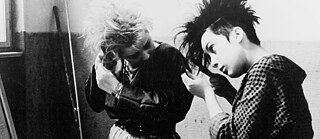Event series
Portraits from an Other Germany
Film|Die frühen Filme von Helke Misselwitz

We are pleased to present Portraits from an Other Germany, a season of screenings and discussions dedicated to the work of East German documentary filmmaker, Helke Misselwitz. The season is curated by Emily Mason in partnership with the National Film and Television School, the Goethe-Institut London and the ICA.
As one of the most significant documentary filmmakers of the German Democratic Republic (GDR), Helke Misselwitz first gained national recognition within East Germany for her 1988 feature film After Winter Comes Spring. In this, as in much of her work, her sensitive and perceptive interview style creates an intimate frame through which to view the private lives of her contributors. Misselwitz tirelessly seeks out personal stories from ordinary people, an approach which occasionally brought her into conflict with film censors when these stories did not conform to official narratives. Her talent as an interviewer is more than matched by her technical mastery; with each stunning composition, Misselwitz reveals how individuals move through the world they inhabit, highlighting the subtleties of relations between the individual and the collective. Helke Misselwitz’s work captures the dying years of the GDR through the lens of those who lived through it, providing an extraordinary portrait from a country which no longer exists.
Focusing on Misselwitz’s early work, these events will include screenings of After Winter Comes Spring (1988), her documentaries from the years leading up to German reunification, Bulky Trash (1990) and Who’s Afraid of the Bogeyman? (1989), and a programme titled "History with a Human Face", which will include three of Misselwitz’s short films alongside Do Right and Fear No One (1975), directed by Jutta Brückner.
Helke Misselwitz will be in conversation via Zoom after the screening of After Winter Comes Spring, and will introduce the "History with a Human Face" programme via Zoom.
With special thanks to Helke Misselwitz and acknowledging the support of the Deutsche Kinemathek.
As one of the most significant documentary filmmakers of the German Democratic Republic (GDR), Helke Misselwitz first gained national recognition within East Germany for her 1988 feature film After Winter Comes Spring. In this, as in much of her work, her sensitive and perceptive interview style creates an intimate frame through which to view the private lives of her contributors. Misselwitz tirelessly seeks out personal stories from ordinary people, an approach which occasionally brought her into conflict with film censors when these stories did not conform to official narratives. Her talent as an interviewer is more than matched by her technical mastery; with each stunning composition, Misselwitz reveals how individuals move through the world they inhabit, highlighting the subtleties of relations between the individual and the collective. Helke Misselwitz’s work captures the dying years of the GDR through the lens of those who lived through it, providing an extraordinary portrait from a country which no longer exists.
Focusing on Misselwitz’s early work, these events will include screenings of After Winter Comes Spring (1988), her documentaries from the years leading up to German reunification, Bulky Trash (1990) and Who’s Afraid of the Bogeyman? (1989), and a programme titled "History with a Human Face", which will include three of Misselwitz’s short films alongside Do Right and Fear No One (1975), directed by Jutta Brückner.
Helke Misselwitz will be in conversation via Zoom after the screening of After Winter Comes Spring, and will introduce the "History with a Human Face" programme via Zoom.
Born in Planitz in 1947, Helke Misselwitz trained as a carpenter and a physiotherapist before eventually finding work in television as a director and assistant director. In 1978, she was accepted into the Academy for Film and Television in Potsdam-Babelsberg, where she studied directing. Upon graduating, she took on a series of jobs, including making films for the Kinobox series produced by the DEFA Studio for Documentary Films. These short films, dealing with a variety of different topics, were played in cinemas before feature length films. Misselwitz’s contributions were consistently distinctive, with several of her Kinobox films initially being banned by authorities. In 1988, her first documentary feature, After Winter Comes Spring, premiered at DOK Leipzig Film Festival to great critical acclaim. This was followed by further successes with Bulky Trash (1990) and Who’s Afraid of the Bogeyman? (1989), highlighting Misselwitz as a filmmaker with a particular affinity for showing how ordinary East Germans were impacted by the political events occuring around them. Following reunification, she made two fiction films, Herzsprung (1992) and Engelchen (1996), and took a teaching role at the Academy for Film and Television, where she had previously studied. Her more recent work includes a 2019 installation about the photographer Helga Paris, and The Poet’s Wife (2021), a documentary about the artist Güler Yücel.
With special thanks to Helke Misselwitz and acknowledging the support of the Deutsche Kinemathek.